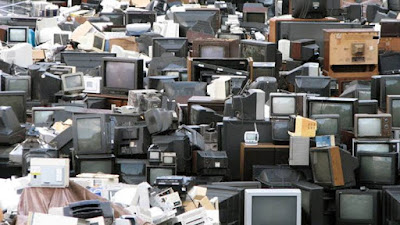REFLECTIONS AS NIGERIA MARKS 2019 INTERNATIONAL E-WASTE DAY
E-waste is defined as electrical and electronic devices ranging from household devices such as air conditioners, cell phones, computers, printers, refrigerators, radios, televisions, to industrial appliances, which have been discarded by their users.
Annually, 20 – 50 million tonnes of e-waste is generated globally and the International Telecommunications Union estimates that 52 million metric tonnes will be generated by 2021 with just 20% recycled. Nigeria currently generates over 290,000 tonnes of e-waste, a 170% increase from 2009.
As global population increases, the demand for electrical and electronic equipment in the industrial, commercial and household sectors also increases, consequently leading to exponential growth in generated e-waste. At the end-of-life phase and with less than 20% recycling rates globally, these equipment end up being burned, illegally traded, dumped, landfilled or treated in a sub-standard way and due to the toxic and hazardous characteristics of e-waste, they cause serious health, social and environmental issues.
 |
| Most of the EEE in Nigeria end up in dumpsites Image Source |
Recognizing the dangers posed by the global e-waste crisis, the WEEE (Waste Electrical and Electronic Equipment) Forum developed the International E-waste Day (IEWD), which was first held in October 2018 to highlight the increasing threat posed by e-wastes and encourage e-waste recycling globally, and to continuously discuss ways of managing e-waste.
To achieve a world with minimal pollution impacts from e-waste, we must shift from business-as-usual to pay more attention to e-waste recycling, which has tremendous economic potentials.
Nigeria is a major recipient of used electronics from abroad; though there are no proper records of total e-wastes being dumped in Nigeria from other countries, but Green Compass Recycling recently revealed that 90% of Africa’s e-waste is dumped in Nigeria.
A United Nations University research showed that more than 69,000 tonnes of used electronics and electrical equipment are shipped into the country annually through Lagos ports alone. The amount dumped through land or air routes, and other ports in Nigeria, is unknown.
In Nigeria, it is mind-boggling to know that with about 200 million people; there are very few officially recognized e-waste recycling companies to safely handle the e-waste generated in the country, and according to the International Labour Organization (ILO), about 100,000 people work in the informal e-waste recycling sector in Nigeria. These scavengers and informal e-waste workers collect and dismantle electronics by hand to reclaim the saleable components, while also exposing themselves to harmful chemicals that reduces their average life expectancy.
 |
| About 100,000 people work in the informal e-waste recycling sector in Nigeria - ILO Photo: Jon Spaull/SciDevNet |
Over half a million tonnes of e-wastes are processed in the country every year and with Nigeria’s population explosion, the amount of e-waste generated is bound to continue its upward trajectory. Nigerians might be drowning in their e-wastes, sooner than expected, if there is no holistic disposal and management system, in place.
To address the e-waste menace in Nigeria, the government through the National Environmental Standards and Regulations Enforcement Agency (NESREA) established the E-waste Producers Responsibility Organization (EPRON) in 2018 under the Extended Producers Responsibility (EPR) Programme, to promote the sustainable production and consumption of electronic and electrical equipment, by encouraging producers to take responsibility for the entire life cycle of their products.
To support the EPRON initiative, NESREA also embarked on an ambitious project tagged ‘Circular Economy Approach for Electronic Products’. This project, also known as the Circular Electronics Initiative, was launched in June 2019, and is being executed in collaboration with United Nations Environment Programme and the Global Environment Facility.
 |
| The Circular Electronics Initiative aims at working with private sector to develop a cost-effective recycling & disposal systems Image Source |
The Circular Electronics Initiative, which aims at working with private sector to develop cost-effective recycling and disposal systems for electronic products, is a step in the direction; however, lack of public awareness, adequate database of players (especially for informal workers), and the complexity of the local market in the e-waste industry, is a huge challenge for the initiative.
An organized e-waste collection system is critical to achieving a circular economy for electronic products in Nigeria. The nation’s dependence and prevalence of informal e-waste collectors is not sustainable and threatens both the health of the informal workers and the environment. In addition, there is cogent need for widespread sensitization on the collection, recycling and disposal routes for e-wastes in Nigeria.
A sustainable circular economy for electronic products in Nigeria is inevitable, if Nigeria is to avert the looming e-waste crisis.
It is worth noting that while the e-waste is a threat, it also offers a leapfrog opportunity for sustainable socio-economic development. A United Nations University Report in 2015 stated that the 42 million tonnes of e-waste that was dumped in 2014 cost the global economy $52 billion.
According to the Environmental Justice Atlas, a metric tonne of electronic scrap from used computers contains more gold than can be extracted from 17 tonnes of gold ore. In addition, other scarce and valuable materials such as cobalt and platinum can be recovered from e-waste through a safe and efficient recycling industry. Thus, making the e-waste sector, an attractive sector for investment.
Written By:
Temple Oraeki (temple@hopespring.org.uk)
Adesuwa Obasuyi (suwaobasuyi@gmail.com)



Great Article
ReplyDeleteWeldone Temple!!!
ReplyDeleteGreat article!
ReplyDeleteI have a solution in mind to the NIgeria WMS and I will love to share them with you.
Kindly reach out at;
jolaiyaemmanuel@gmail.com
and follow back @jeafreezy on Twitter so I can access your DM.
Thanks